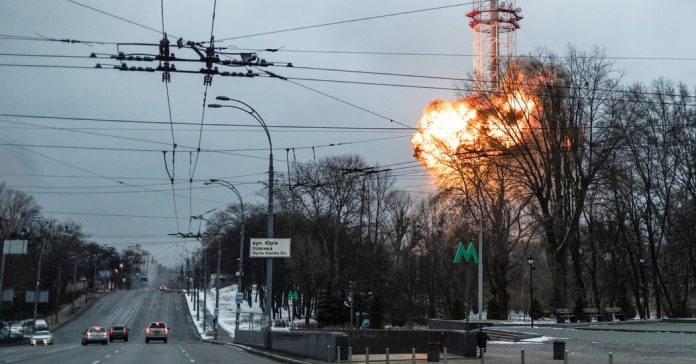As Russia is making an attempt to chop off the circulate of data in Ukraine by attacking its communications infrastructure, the British information outlet BBC is revisiting a broadcasting tactic popularized throughout World Conflict II: shortwave radio.
The BBC mentioned this week that it might use radio frequencies that may journey for lengthy distances and be accessible on moveable radios to broadcast its World Service information in English for 4 hours a day in Kyiv, the Ukrainian capital, and in elements of Russia.
“It’s usually mentioned reality is the primary casualty of warfare,” Tim Davie, director-general of the BBC, mentioned in an announcement. “In a battle the place disinformation and propaganda is rife, there’s a clear want for factual and impartial information individuals can belief.”
On Tuesday, Russian projectiles struck the primary radio and tv tower in Kyiv. Oleksii Reznikov, Ukraine’s protection minister, wrote on Twitter that Russia’s purpose was “to interrupt the resistance of the Ukrainian individuals and armed forces,” beginning with “a breakdown of connection” and “the unfold of huge FAKE messages that the Ukrainian nation management has agreed to surrender.”
Shortwave radio has been a go-to car to achieve listeners in battle zones for many years, used to ship crackling dispatches to troopers within the Persian Gulf warfare, ship codes to spies in North Korea and hold forth by way of the Iron Curtain in the course of the Chilly Conflict. However extra fashionable types of radio together with the web finally pushed shortwave out of favor; the BBC retired its shortwave transmissions in Europe 14 years in the past.
During the last week of February, viewership of BBC’s Ukrainian language web site greater than doubled from a 12 months earlier to three.9 million guests, the broadcaster mentioned on Wednesday. The BBC additionally gives information protection within the nation through its web site, YouTube, Fb, Twitter, Telegram, Viber and Espreso TV.
Hundreds of thousands of Russians are additionally turning to the BBC, the broadcaster mentioned. The viewers for the BBC’s Russian language information web site reached a file 10.7 million previously week, greater than tripling its weekly common up to now in 2022, the corporate mentioned. Guests to BBC’s English language web site from inside Russia surged 252 p.c to 423,000.
Throughout the nation, BBC additionally posts updates on Telegram, Instagram, Fb and YouTube. Different Western information retailers have additionally skilled a surge in viewership. Visits to The Guardian’s digital platforms from Russian and Ukrainian audiences have been up 180 p.c from January.
The BBC’s protection has led to complaints from Russian officers. Maria Zakharova, the spokeswoman for Russia’s Overseas Ministry, mentioned throughout a briefing broadcast by RT, the Kremlin-backed Russian media outlet, that Russia was the sufferer of “unprecedented info terrorism” that was “dedicated to discrediting Russian actions” and “creating hysteria round Ukrainian occasions.”
The BBC “performs a decided function in undermining the Russian stability and safety,” Ms. Zakharova mentioned, with out offering proof.
Early Friday, BBC’s Russian service reported problems accessing its web site in Russia.


